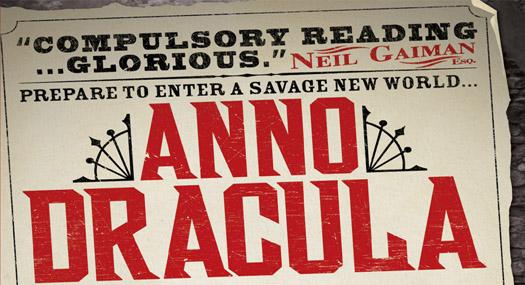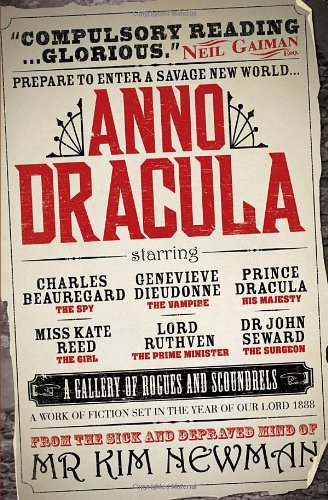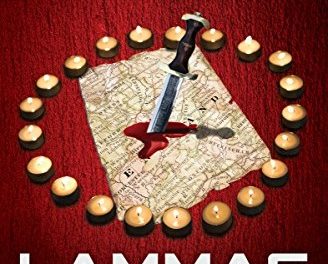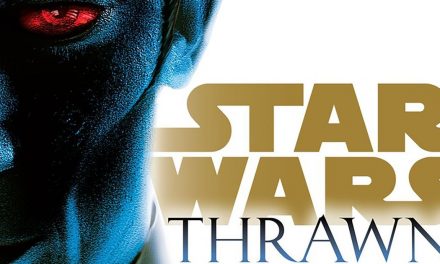“I heard this evening from one of the reporters that he has sent a letter to the newspapers. He wants to be called Jack the Ripper, he says.”
“Jack the Ripper?”
“Yes.”
“Silly name. No one will ever remember it. Silver Knife he was, and Silver Knife he’ll always be.”
– Anno Dracula
“Let me illustrate. In New Mexico, ten years ago, a new-born ran riot, killing without thought. A warm man, Patrick Garrett, loaded a shotgun with sixteen silver dollars and peppered his heart with razor-shards. The new-born was Henry Antrim or William Bonney, a cretin leech who deserved his fate. Soon after, stories began to circulate. Dime novels elaborated upon his youth and romantic appeal. Billy the Kid, they call him now, Billy Blood. Squalid murder and pathetic crime are forgotten and the American West has a range-riding vampire demi-god. You can read in the penny press how he rescued fair maidens and was rewarded with their freely-bestowed favours, how he stood up for poor farmers against cattle kings, how he only became a killer to avenge the death of his father-in-darkness. It’s all bunkum, Godlaming, all a pretty lie for the newspapers. Billy Bonney was so low he’d bleed his own horse but now he is a true hero. That will not happen, in this case. When Silver Knife is hoisted to the stake, I want a dead madman, not an unkillable legend.”
– Lord Ruthven, Anno Dracula
“Mr Beauregard, I find myself surrounded by the Prince Consort’s get. It’s too late to complain, but Vlad Tepes hardly represents the best of my kind.”
– Genevieve Dieudonne, Anno Dracula
Originally published in 1992, Anno Dracula supposes that events of Bram Stoker’s novel went horribly sideways and creates an alternative history, where Vlad Dracula now rules a British Empire where dissidents disappear to prison camps, at best and, at worst, are subject to that which earned Dracula his infamous nickname. It weaves Victorian Era contemporaries (historical and fictional) into a tale of life, death, love, politics, social change, murder and intrigue.
The year is 1888, three years after the Demeter brought Vlad Dracula to British soil. The elder vampire has married Queen Victoria, becoming the Prince Consort and Lord Protector of Britain. Vampirism is now all the rage in the Empire. Elder vampires have come out of the shadows and Prince Dracula’s diseased blood spreads throughout Britain. But vampires as old as Dracula don’t easily set aside their old ways. And with his Carpathian Guard roaming the country, the Empire is slowly sliding back into the 15th Century.
Tensions between the British government and the people – not to mention between vampires and the warm (mortals) are already on the rise. And to make matters worse, the killer known as “Silver Knife” has just claimed his third victim, in Whitechapel.
The 2012 reprinting includes a section of annotations (to supplement what fans have posted online, over the years), an afterword, an alternate ending, excerpts from a script adaptation that – sadly – never came to pass, an essay on why Dracula could not have been Jack the Ripper and a short story of Dracula’s first encounter with a horseless carriage.
Anno Dracula sets up a rich environment that Kim Newman has returned to again and again, with additional offerings, in the Anno Dracula timeline.
What I Liked
While I love history, I’m not normally into alternate history. As Newman points out, most alternate history scenarios revolve around World War II and what would have happened if the Nazi’s had won. That’s never been a scenario I’ve been interested in. But couch an alternate history story in a vampire novel, throw in Jack the Ripper and then add a who’s who of literary and historical figures and I’m sold. There is so much detail in this novel that every time I read it, I pick up new things. Especially as I gain more familiarity with the ancillary characters. This is a world where Sherlock Holmes is in prison for disagreeing with the current government; a world where Doctors Jekyll and Moreau are working together (what could POSSIBLY go wrong). The book is rife with these kinds of gems that make the fan girl in me jump up and down… As discreetly as possible, of course.
I loved the exploration of what immortality can do to the likes of Oscar Wilde, Professor Moriarty and others. As well as the idea of whether someone who doesn’t change can adapt to a world that rapidly changing.
What I Didn't Like
It’s hard to pick out things that I don’t like about the novel, because it’s so well put together and even the things that don’t seem to fit really do.
I remember when I first read Anno Dracula, I didn’t like that we knew who Jack the Ripper was, from the outset. John Seward all but admits, in the first chapter, that he’s Silver Knife. And after reading some of Kim Newman’s reasoning for picking Seward to be the Ripper, it makes perfect sense. I also remember expecting to see more of Dracula. After all, the book is called “Anno Dracula”. In hindsight, however, both things make perfect sense.
There are a couple of characters, such as Arthur Holmwood who take a bit of a weird turn, towards the end, but these are minor gripes and they do fit with the story.
I tend to forget about the conspiracy angle of the story, until I’m in the middle of it. That’s not necessarily a bad thing, but – without getting too spoilery – the book does take a bit of an abrupt turn, towards the end. There are little hints along the way about where Genevieve and Beauregard, our two lead characters are going to end up, but it’s not obvious… unless you are familiar with any version of Mycroft Holmes. Because, of course he would be pulling some of the strings.
Should I Read it?
Are you a fan of vampire fiction? Jack the Ripper? A good mystery? The Victorian Era? Then yes. Did you like Penny Dreadful or League of Extraordinary Gentlemen? Then definitely, yes! Even if you’re not a fan of these things, I would recommend this book to anyone who has an interest in history and a good “what if?” story.
Review Breakdown
- Plot 90%
- Writing Quality 95%
- Pacing 90%
- Emotional Connection 100%
- Nostalgia 100%
- Rereadability 100%
Review Breakdown
%
Overall Plot
%
Emotional Connection
%
Writing Quality
%
Nostalga
%
Pacing
%
Re-Read-ability
- Overall Rating 96%






